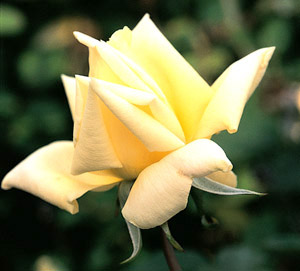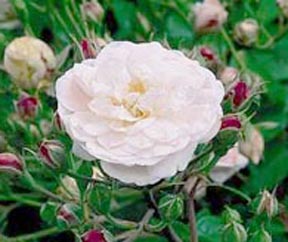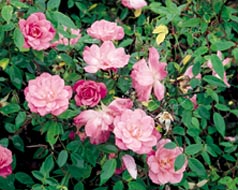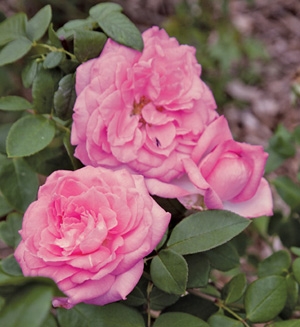LETTERS FROM THE GLOBAL PROVINCE
Three Roses, Global Province Letter, 9 January 2019
Rose is a rose is a rose is a rose/Loveliness extreme. —from Gertrude Stein's "Sacred Emily"
She Had It All Wrong. Stein's pitter patter poem is almost a rap song job, or maybe a digital Google effusion that could be spattered out by some artificial intelligence machine located in the ugliness of Silicon Valley. Everything, certainly every living thing, has a soul like no other—an essence, an ether, a significance found nowhere else in the universe. Old William Shakespeare had it right: "A rose by any other name would smell as sweet," an aroma not to be confused with that of another redolent blossom inhaled by the bee, just inches away.

The storms blowing about the heavens try to erode and murder man and beast and flower, dream of inflicting a horrible sameness in earth's every crevice. If you believed in the mass manufacturing and mass marketing of the 20th century, or hung out with Gertrude in Paris, you insisted perfection lay in sameness, and that we would all profit by inhabiting buildings drenched with the International Style. Sterile and unimaginative. But this writer hopes you have moved on and learned to love nature, which is a temple of uniquen.
"Gather ye rose-buds while ye may." So commands Robert Herrick, and rightly so. There are so many roses about, each with its own wonderment. He warns us "this same flower that smiles today/Tomorrow will be dying." When you straggle towards a new bud, savor it, for it will soon be gone. And recognize that roses come in all shapes and sizes and meanings and colors and purposes. Our divine mission is to look about us with discriminate eyes so as to see and gather. Most of the roses that exist elude ordinary poets who lack the mystical radar that espies the secret and unknown.

Let's see. First off, there is Billy Rose, an impresario, songwriter, and nightclub owner of the 20th century, who lit up stages, occasionally stole the writings of others, and went Mr. Ziegfield one better. For his wife, he plucked quite a rose, the famed comedian and singer Fanny Brice. Early on he worked for Bernard Baruch, from whom, we are sure, he learned how to make a nickel. He knew he had met a genius. "In 1946 Rose's memoir Wine, Women and Words, dedicated to Rose's early patron Bernard M. Baruch, was published in New York by Simon & Schuster. The book was illustrated, including the cover of the numbered and signed first edition of 1500 copies, by Salvador Dalí whom Rose met while producing events at the 1939 World's Fair." When he passed away, he was worth $42 million, $300 million or so in today's dollars. A short little man who liked to date tall women, Rose was far bigger than the shadow he cast, but not a rose in any conventional sense.
Another eccentric rose is Four Roses, a bourbon many of us considered rotgut. But it has been resurrected. Dating back to the late 19th century, it was the child of Rufus Rose or maybe Paul Jones, its birth part of its checkered history. In time it was taken over by industry juggernauts such as Seagram, Vivendi, and Diageo, all of whom pretty much made a mess of things. Now it is owned by Kirin, the giant Japanese beer company, which discontinued the blended whiskey all of us avoided, and, simply, only made Four Roses Kentucky straight bourbon whiskey. As is their wont, the Japanese went to the high end of the market, something they have often done in crowded marketplaces in order to find a defensible market position This rose, therefore, is all about survival, a good thing since many roses have become extinct. Certain fine roses that flourished in the South before the Civil War, for instance, have totally disappeared.
The Wars of the Roses. "The Wars of the Roses were a series of English civil wars for control of the throne of England fought between supporters of two rival branches of the royal House of Plantagenet: the House of Lancaster, associated with a red rose, and the House of York, whose symbol was a white rose. Eventually, the wars eliminated the male lines of both families. The conflict lasted through many sporadic episodes between 1455 and 1487…." (wikipedia). Roses, it seems, are often associated with devastation, a far cry indeed from Stein's image of rosedom. The rose, indeed, is not a symbol of the limits of man's imagination, but a painting of its wondrous unfettered fertility.

Immortals. Which roses, you may ask, most flourish in our garden of dreams? For us the brightest flowers are the immortals, those who never die, even if they have been proclaimed dead, and have been thrown under the sod. Yes, William Shakespeare. Oh yes, Luciano Pavarotti. Their ability to light up the earth was so immense, their ability to fill a room unparalleled, that even today the cheers and fervor have not passed away. The newspapers (for we know the journalists tend to get it wrong on important issues), have said they are gone, but they inflame our minds and senses every day. Roses in disguise as men. Les us consider another three immortals who we are told passed away in recent times, only to be with us forever.
2018 and 2017 saw a host of fine men put out to pasture. Perhaps they were not noticed, since our media has such a fondness instead for leaders and celebrities of little character. For instance, James A. Duke was, plain and simple, a lead scientist who spent his career at the Department of Agriculture studynig the medicinal use of plants, which involved several trips up the Amazon and to other places in South America. Along the way he spun poems and songs about plants which, oft as not, he would render when giving speeeches across the country. He also opined on the Green Pharmacy, a program on plant medicine.
He was nice enough to contribute a thought or two to our website: we particularly enjoyed a speech of his which suggested to the drug overlords in Washington that they include a plant alternative in FDA testing of new drugs to see if plants could do the job as well. This proposal was rather important because commerical drugs are far too expensive and virtually all the major drugs are riddled with bad side effects. We know, for instance, that most of the strange problems heart patients have in after care result not from one's heart condition but from the heart drugs given to prevent new problems. When we expressed interest in what plants might help out on a parrticular medical condition, Dr. Duke freely sent us copious notes. Ironically, it took the New York Times a full year (in December 2018) to catch up with the fact that he had passed away in 2017. Like most of our publications, the Grey Lady has become better at following the sensational, rather than the important., and misses half the news that's fit to print.
P.M. Forni, recently deceased professor of 14th century Italian literature at Johns Hopkins, only recently made his mark in the world with his 2002 book Choosing Civility: The Twenty-Rules of Considerate Conduct. It is a modest little tract, hoping to urge one and all to be nice to one another. And it's had effects, seeping into the life of Columbia, Maryland, a town virtually created by James Rouse, an idealist developer who thought properly conceived towns could enhance the good life, espousing human values as much or more than economic gain. As it happens, the town has taken Forni to heart.

He reminds us of Gene Sharp, whose modest Albert Einstein Institution in Boston and whose simple, clear writings are feared by dictators around the world—many of whom sense that his words about passive resistance have more power than those of Gandhi. His booklets are often found in the hands of protesters trying to topple dictatorial regimes. Forni, in his words and example, convinces us that he who would make the world better must embrace a modest, restrained demeanor. A passive style if you like.
Even more modest that Jim Duke or Forni was the world's rosemaster, David Austin. As his obituary noted, he created more than 200 hybrids, and, for all intents and purposes, virtually re-created the rose world, recapturing old scents but designing a host of new beauties. But for all his succcess, he was "quite shy and very happy to dedicate his life to roses."
Our three roses, roses almost unnoticed, were the sort that did things enduring, surely made the world a better place, and often put beauty on its trails. Oh, let us venerate Duke, Forni, and Austin, circumspectly, with no monuments needed. Stealthy praise. Surely these are men who would have a long but small cup of coffee, a cortado perhaps, in the morning and think that the world got started on the right foot.

P.S. Let us not forget the salt-rose, originally from Japan, which grows near the ocean, and is hardier than our everyday roses, resistant to a host of diseases that afflict its lesser kin. Some call it the rosa rugosa, or salt spray rose. We call it the rugged rose. It is a creature apart from the roses we put on the dining room table, or the roses in the beds outside,which are hardly immortal. Neruda, the poet of love and beautiful plants, speaks of an even stronger rose which harbors eternality in its blossom.
P.P.S. Nippon's population is stagnant and sales are declining, and Japanese beer companies have been going overseas and getting into whiskey. Suntory, for instance, bought Jim Beam in 2014, then the largest overseas acquisition by the Japanese since Softbank snapped up Sprint. In this respect, the Japanese showed a lot more gumption then the Americans, who generally were acquired instead of acquiring. America's economy has been consolidating and disappearing, as workers across the Midwest know all too well.
P.P.P.S. We have earlier said that "Re-igniting Beauty," is a worthy task ahead for those who care about this earth. Implicit in this is that our economic code and infernal dogmas have thrown a wet blanket over all the earth. It is time to lift the tarpaulin and let the flowers, gone, blossom again. A studious ugliness has fallen over all our activities to include fields where we might expect better. Art is no longer art, but psychotic design. Music no longer rhymes, but raps instead. And so it goes. Fashion mixed with tattoos has converted ladies into mannequins. Copycat TV commentators now all seem to sport the same silly half mustaches or goatees, proving they are hip even if their words belie a lack of originality, and their looks are drab.
P.P.P.P.S. Forni wrote several books on the delightful Boccaccio whose Decameron took his characters out to the countryside so they could rest and tell wonderful tales to each other, a way to while away the time while the Black Death passed and Florence healed itself. We can only think that this means when things are awry, you can only rediscover life slowly.
Home - About This Site - Contact Us
Copyright 2019 GlobalProvince.com